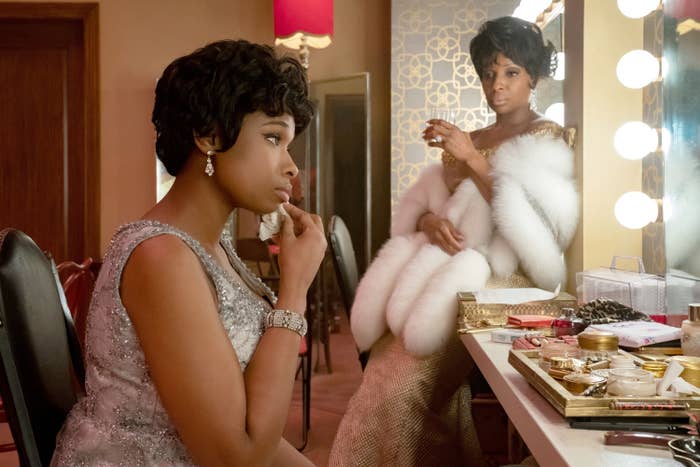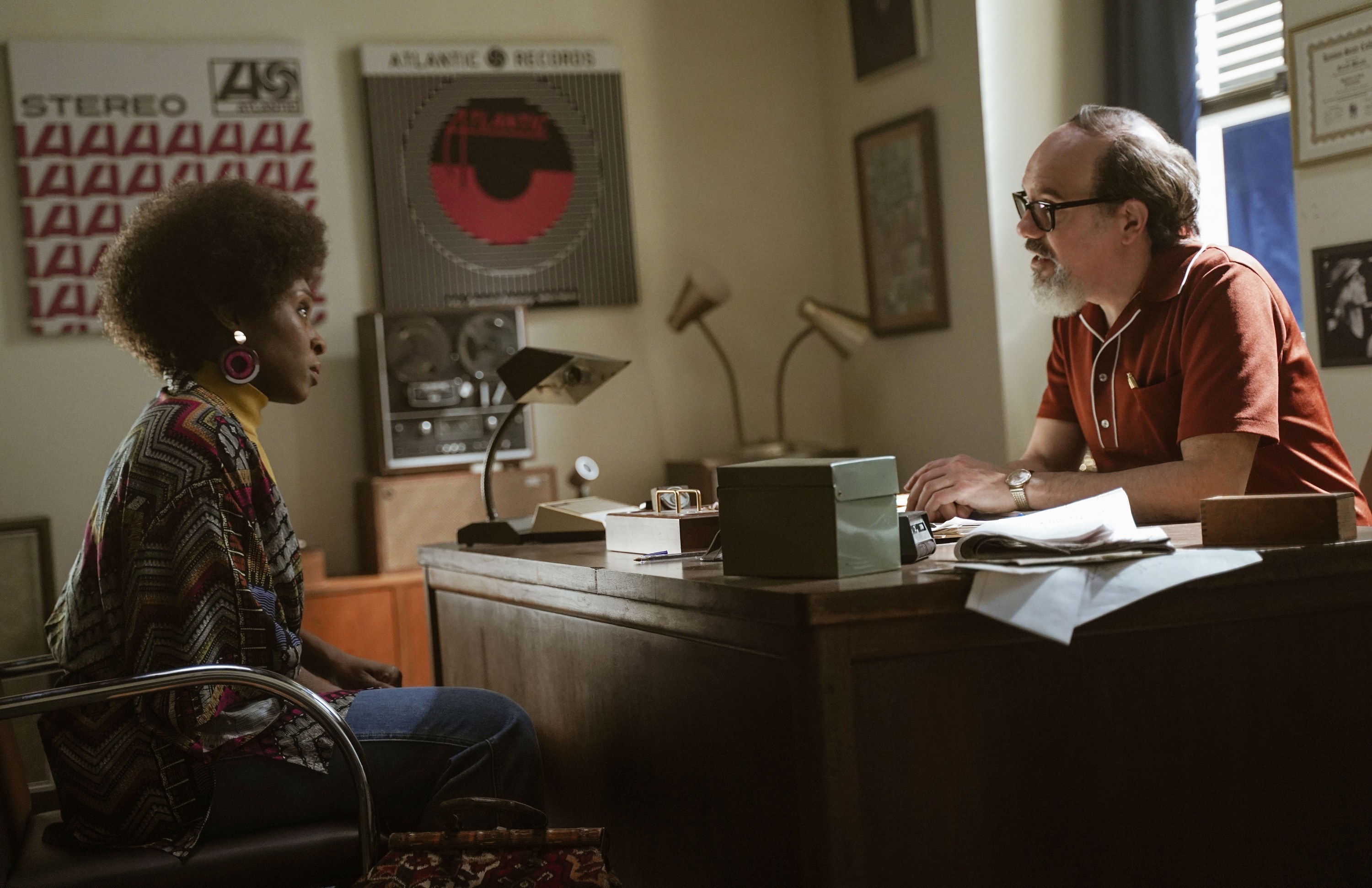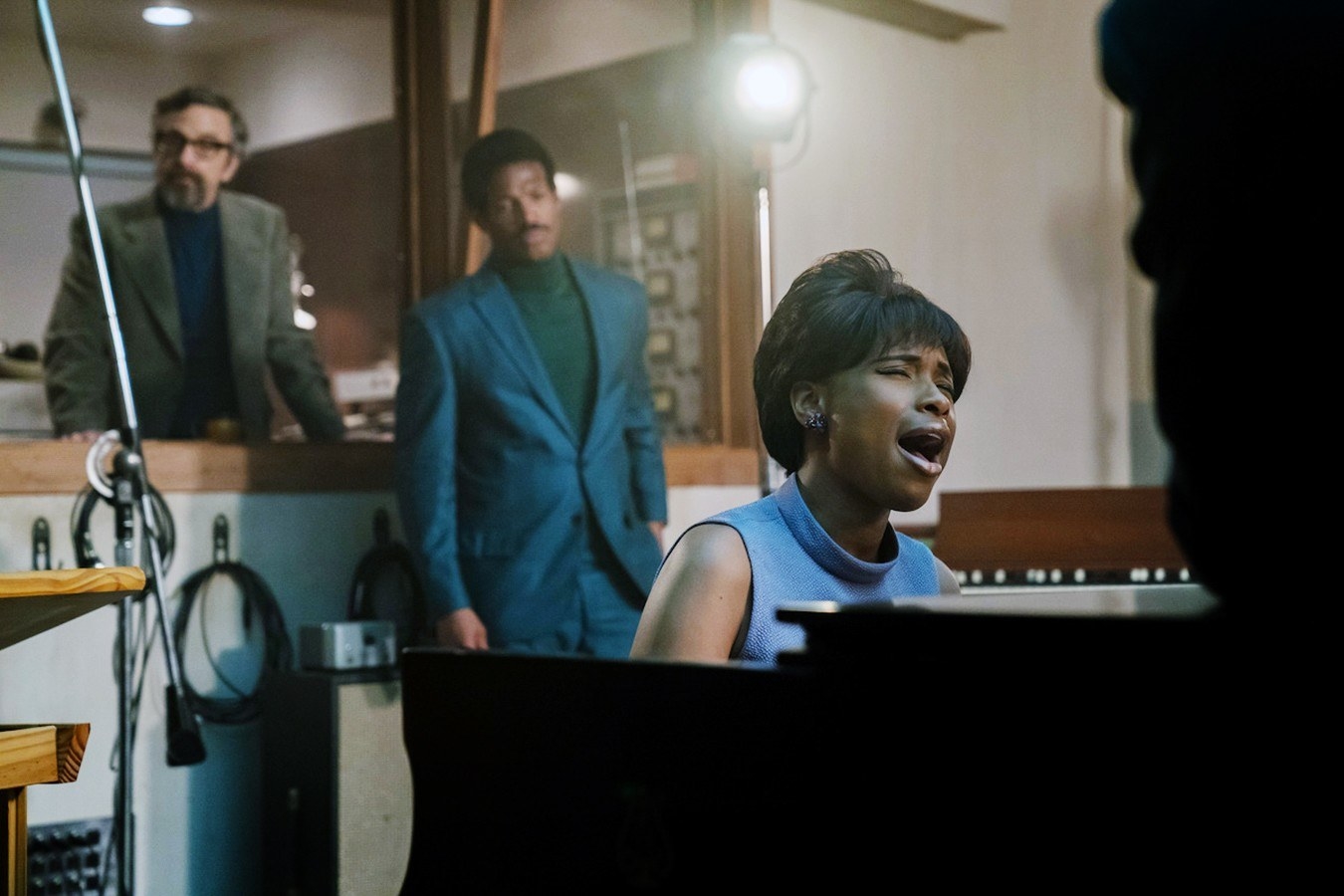There are two recent accounts of Aretha Franklin’s legendary life. Only one succeeds at telling a complex story.
Respect, starring Academy Award–winning actor Jennifer Hudson, follows the successes and struggles of music legend Aretha Franklin. Directed by Liesl Tommy, it boasts star power, including Hudson, handpicked by Franklin herself to portray her onscreen (the diva originally wanted Halle Berry to have the honor); Forest Whitaker (as Aretha’s father, C.L. Franklin); Audra McDonald (as Aretha’s mother, Barbara Siggers Franklin); and Mary J. Blige (Dinah Washington). Delayed amid the pandemic, it comes nearly five months after Genius: Aretha, a television miniseries starring Cynthia Erivo. While not perfect, the latter is a much more effective and layered look at the life of the woman who possessed one of the nation's greatest voices. Spanning eight episodes, it details Franklin's life without making it seem as though she was only the sum total of the trauma she dealt with.

That Respect didn’t knock it out of the park feels like somehow flunking a test when the cheat sheet was readily available. Unlike the miniseries, it was able to use some of her most well-known hits, including “Respect,” “Think,” and “(You Make Me Feel Like) A Natural Woman.” But the film tries to pack Franklin’s life into two hours and 25 minutes, leaving out important context, and squanders musical moments that should have felt electrifying. And that makes it resemble a scroll through the singer’s Wikipedia page rather than an engaging deep dive that could have brought greater dimension to a woman who suffered immensely in order to share her talent with the world. The film touches upon the major moments of Franklin’s life, from her early beginnings singing at church to her struggle to craft the kind of artist she wanted to be and her dedication to the civil rights movement. But ultimately, the latest biopic about the Queen of Soul does not coalesce into a fulfilling narrative.
It begins in 1952 Detroit. A young Aretha Franklin (Skye Dakota Turner), asleep in bed, is awakened by her father in the middle of the night to sing. Downstairs there’s a lively party in full swing — populated by carousing adults, it’s not exactly a suitable environment for children. One man briefly grabs another (presumably gay) man by the waist, an interaction that seems to have mainly been included to expose Pastor Franklin’s contradicting values: a licentious man of God, he held his children, especially his daughter Aretha, to a standard he himself could not maintain.
Later in the film, Aretha’s mother Barbara comes by his house to pick up the children. By this point, the couple have separated, likely due to C.L.’s adultery. Barbara utters lines like “Your daddy doesn’t own your voice” and “Never fear any man”; C.L. sounds like a typical disappointing, controlling father. But this glosses over the well-known details of his real-life transgressions. In obscuring the more shocking reasons behind the breakdown of Franklin’s parents’ marriage, Respect makes its first misstep. Figuring out what to include in a biopic is a complicated calculation, balancing entertainment value and the responsibility of grappling with a real person’s legacy. But while Respect gives the impression of a warts-and-all approach, it omits details, seemingly as a way of showing deference to the singer.

Genius: Aretha takes a different tack, addressing the fact that Aretha’s father allegedly raped and fathered a child with a 12-year-old girl. And that’s what makes Genius: Aretha the better project. The miniseries paints Aretha’s life in a way that’s much more well-rounded, not shying away from the parts of the singer that some may deem ugly, like her determination to get ahead at all costs. This is laid out spectacularly in a scene where Aretha, after failing to land a film role as blues singer Bessie Smith, rethinks her decision not to record songs for the 1976 Sparkle soundtrack, produced by Curtis Mayfield. Because Aretha hadn’t initially responded to Mayfield’s request, he asked her sister Carolyn, who excitedly told her superstar sister the good news. Carolyn, thrilled about the prospect of restarting her career, is thwarted when Aretha decides to record the soundtrack after all. This gets at the notion that the real-life Aretha was jealous of women she deemed competition, a claim she often denied.
While Respect gives the impression of a warts-and-all approach, it omits details
The miniseries also depicts Aretha’s early upbringing with more complexity, including her father’s negligence and her pregnancy at age 12. While touring with her father as a young girl, Aretha ends up at a party where one man offers her a drink; another approaches and compliments her singing before asking her to dance. C.L., who’s entertaining women elsewhere, isn’t around to take care of his daughter. In another scene, a 12-year-old Aretha cries as she tries to process the news that she is pregnant. Aretha’s grandmother seeks to hold the unnamed person responsible, but her father responds, “We could waste time and chase after worldly justice or we could simply accept that this is a part of the mission that God has for her.” Respect includes Aretha’s early pregnancies too, but Genius does a better job of detailing how the young singer was failed by so many of the adults around her. (It’s hard not to wonder if this was one of the reasons for the feud between the singer’s estate and the Genius team when the project was being made.)

In Respect, Jennifer Hudson is adequate as Aretha, though at times her performance feels robotic. She nails Aretha’s speaking voice, especially in the scenes where she flirts with lover Ted White (Marlon Wayans), a hustler who would eventually become her manager, in the honeymoon stages of their relationship. But during the songs you can’t help but be reminded that while Hudson is a great singer, she is no Aretha Franklin. When Hudson’s Aretha collaborates with the white boys of the Muscle Shoals Rhythm Section, recording the hit “I Never Loved a Man (The Way I Love You),” the difference between the original and the onscreen depiction is stark. Hudson is pitch-perfect, but doesn’t capture the singer’s sensuality and breathiness. Even in the film’s most important musical number, Aretha’s performance of “Respect” at Madison Square Garden, there’s a maddening lack of enthusiasm. The title song, so commanding in its original version, feels small here.
Respect is set up as a tale of Aretha eventually finding her voice after being controlled by various men, from her emotionally abusive father to the physically violent Ted, as well as industry executives who failed to give her the resources that she deserved. But the intended vision ultimately doesn’t land. Instead, the film delves into clichéd biopic territory, making obstacles like Aretha’s struggles with alcohol (presumably because of unhealed childhood trauma) feel almost simplistic. And because the film itself basically amounts to a highlight reel with a few dramatic moments sprinkled throughout, the emotional arc never truly takes flight. This is why the supposed climax of the film, which sees Aretha setting up to perform what would become Amazing Grace, the bestselling project of her career, falls flat.
Tellingly, the most emotionally resonant part of the film comes at the very end. Before the credits begin to roll, we see real footage of Aretha performing “(You Make Me Feel Like) A Natural Woman” at the Kennedy Center in 2015. Filmed just three years before she died, the clip honors her magnificence right up until the very end. She sounds sublime, and at one point, she gets up, letting her mink coat fall to the ground as she triumphantly delivers one of her career-defining songs. The camera pans to show President Barack Obama tearing up, the audience’s standing ovation, and Carole King, who cowrote the song, weeping. The performance gives me chills every single time. It also reminded me of something Respect fails to do: showcase Aretha as a once-in-a-lifetime talent. While the film aims to give the singer the veneration she deserves, it’s almost as if the creators knew that the only person who could truly give the queen her “propers” was none other than Aretha herself.

Genius: Aretha ends in a similar way. Though the miniseries definitely has some dialogue problems — the writing can be cloying — it peels back the layers of Aretha’s life to show a more complete picture of who she was. In an interview, Suzan-Lori Parks, the Pulitzer Prize–winning showrunner of Genius: Aretha, said: “How do I tell the truth about this Black American woman who is a brilliant icon? And how do I tell the truth and be respectful?” That intention comes across in the project. Erivo’s solid performance (I’m going to ignore the fat suit she dons at the series’ end) thankfully avoids the curse of coming across as pure impersonation. The series nimbly balances Aretha’s artistry, her imperfections, family dynamics, and trauma, demonstrating how remarkable the singer was — how human she was.
Aretha, always reluctant to talk much about her personal life, preferred to express herself via music. “In her selection of songs, whether written by others or by herself, she unfailingly opts for those that frame her own view of life,” Time wrote in its 1968 cover story about Franklin. “If a song's about something I've experienced or that could've happened to me, it's good," she told the magazine at the time. “But if it's alien to me, I couldn't lend anything to it. Because that's what soul is about — just living and having to get along.” In its final scene, Genius: Aretha shows the singer performing “Nessun Dorma” at the 1998 Grammys. Filling in at the last second for opera singer Luciano Pavarotti, who had a sore throat, she pulled off one of the greatest performances in the event’s history. While preparing for the unscheduled appearance, Aretha talks to her sister about the song’s meaning. “The people won’t sleep until they discover the singer’s secrets,” she says. Interspersed with flashbacks of her more private moments, it’s the perfect encapsulation of how she kept music, her saving grace, at the forefront of her life. ●
